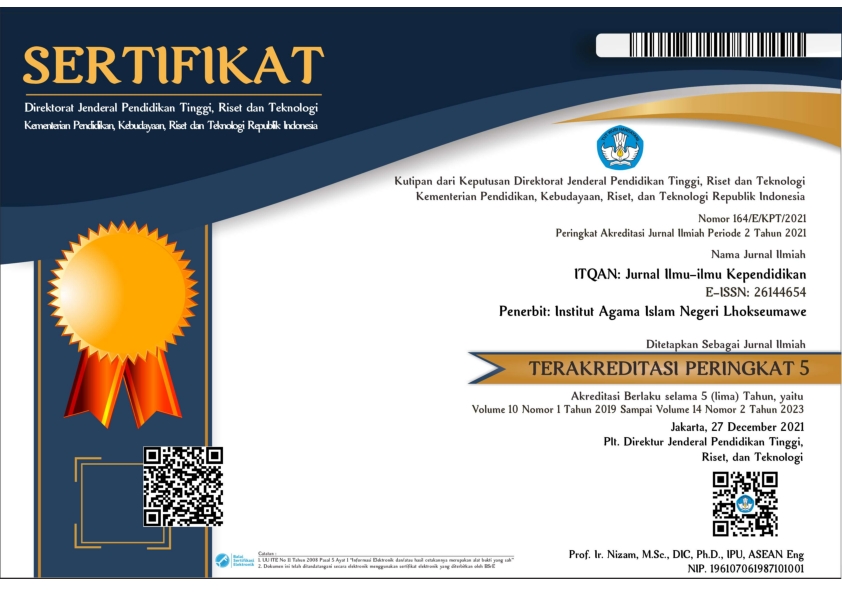Persepsi Pendidik PAUD terhadap Tes Masuk di Tingkat Sekolah Dasar
Main Article Content
Noval Fuadi
This study aims to describe the perception of Early Childhood Education educators on entrance tests at the elementary school level, including (a) Early Childhood Education Educators' knowledge of the concept of Early Childhood Education; (b) knowledge of Early Childhood Education educators on the implementation of entrance tests; and (c) the attitude of Early Childhood Education educators towards the implementation of entrance tests at the elementary school level. This research approach is a qualitative research with the type of case study research. As for the results of this study, firstly, from the aspect of knowledge of Early Childhood Education educators on the concept of Early Childhood Education, it is known that there are still Early Childhood Education educators who do not yet know the concept of Early Childhood Education; second, from the aspect of Early Childhood Education educators' knowledge of the implementation of the elementary school entrance test in Lhokseumawe City, it shows that in general, Early Childhood Education educators already know about the forms of tests, but the application of the tests used to see developments in children is still inaccurate and third, the perception of Early Childhood Education educators on the implementation of the entrance test at the elementary school level in the city of Lhokseumawe is that educators do not agree with the implementation. This is considered to be able to shift the concept of learning early childhood education actually.
Anak, A. M. P. P. P. (2002). Direktorat Pendidikan Anak Usia Dini. Depdiknas. Jakarta.
Arikunto, S. (2013). Dasar-Dasar Evaluasi Pendidikan, Edisi 2. Jakarta: PT. Bumi Aksara.
Dishman, R. K., Motl, R. W., Sallis, J. F., Dunn, A. L., Birnbaum, A. S., Welk, G. J., … Jobe, J. B. (2005). Self-Management Strategies Mediate Self-Efficacy and Physical Activity. American Journal of Preventive Medicine, 29(1), 10–18. https://doi.org/10.1016/j.amepre.2005.03.012
Fadillah. (2012). Desain Pembelajaran PAUD. Yogyakarta: Ar-Ruzz Media.
Huliyah, M. (2016). Hakikat pendidikan anak usia dini jalur pendidikan informal. Pendidikan Guru Raudlatul Athfal, 1(1), 61–62.
Junanto, S., & Kusna, N. A. A. (2018). Evaluasi Program Pembelajaran di PAUD Inklusi dengan Model Context, Input, Process and Product (CIPP). INKLUSI: Journal of Disability Studie, 5(2).
Kizlik, B. (2012). Measurement, Assessment, and Evaluation in Education. Retrieved October, 10, 2015.
Miftah, T. (2003). Perilaku Organisasi Konsep Dasar dan Aplikasinya. Jakarta: PT Raja Grafindo Persada.
Moleong, L. J. (2019). Metodologi Penelitian Kualitatif.
Mulyana, D. (2014). Ilmu Komunikasi: Suatu Pengantar. 2014: PT. Remaja Rosdakarya.
Munastiwi, E. (2019). Manajemen Ekstrakurikuler Pendidikan Anak Usia Dini (PAUD). Manageria: Jurnal Manajemen Pendidikan Islam, 3(2), 369–380. https://doi.org/10.14421/manageria.2018.32-09
Prasetyo, M. A. M., & Bashori, B. (2021). Modernitas Pesantren Ditinjau dari Aspek Kurikulum (Studi Kurikulum Berbasis Minat Bakat). Jurnal Administrasi Dan Manajemen Pendidikan, 4(2), 95. https://doi.org/10.17977/um027v4i22021p95
Purwanto, N. (1998). Administrasi dan Supervisi Pendidikan. Bandung: Rosda Karya.
Salabi, A. S. (2020). Efektivitas Dalam Implementasi Kurikulum Sekolah. Education Achievement: Journal of Science and Research.
Sit, M. (2017). Psikologi Perkembangan Anak Usia Dini Edisi Pertama. Kencana.
Slameto. (2015). Belajar dan Faktor-Faktor Yang Mempengaruhinya. Jakarta: Rineka Cipta.
Tanner, D. (2020). History of Curriculum Development in Schools. In Oxford Research Encyclopedia of Education. https://doi.org/10.1093/acrefore/9780190264093.013.1037
Umiarso, U., Baharun, H., Zamroni, Z., Rozi, F., & Hidayati, N. (2021). Improving Children’s Cognitive Intelligence Through Literacy Management. Jurnal Obsesi : Jurnal Pendidikan Anak Usia Dini, 6(3), 1588–1598. https://doi.org/10.31004/obsesi.v6i3.1817
Wiyani, N. A. (2013). Bina Karakter Anak Usia Dini. Yogyakarta: Ar-Ruzz Media.



